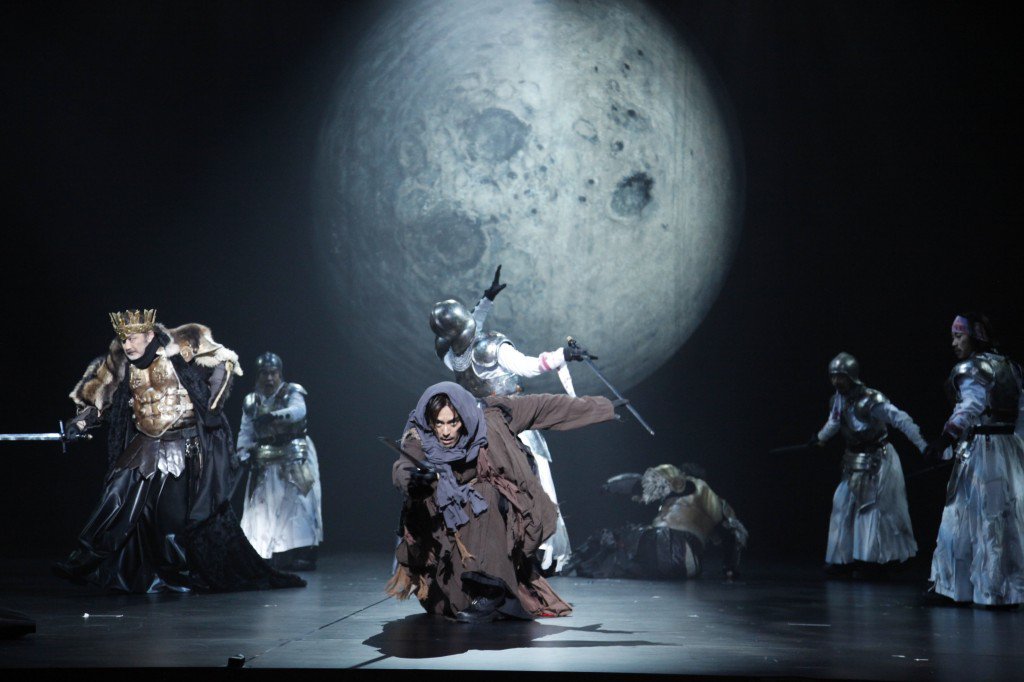Ninagawa x Shakespeare
An illustrated talk by Yuriko Akishima, King’s College
London
Wednesday 21 September 2016
Safra Lecture Theatre, Kings College London Strand Campus
Review by Sara Rumberg, Classics (Postgrad Diploma)

Cymbeline. Copyright, Takahiro Watanabe
In April this year, 400 years after Shakespeare’s death, Japanese theatre and film director Yukio Ninagawa declared his wish to produce all 27 of Shakespeare’s works, together with his ninth “improved” version of Hamlet. Sadly, before this could happen, Ninagawa passed away on 12 May 2016, leaving an extraordinary legacy of theatrical fusion which has brought Britain’s 16th century bard to the East and Japan’s equally old dramatic traditions to Western stages. Starting as an actor in the theatre, for over 47 years Ninagawa brought the classics of Western drama - from Sophocles to Brecht, Shakespeare, Ibsen and Chekov - to Japanese audiences.
In a talk illustrated by film clips from Ninagawa’s stage productions, journalist, colleague and friend of Ninagawa, Yuriko Akishima, recalled her personal experience of working with Ninagawa and gave insight into some of the techniques and themes used by this ground-breaking director.
Akishima informed the audience, most of which had attended a Ninagawa Shakespeare production that Shakespeare is included in the national curriculum in Japan, and that Ninagawa’s primary objective was to bring these works to a Japanese audience wrapped in a kimono by using cultural icons which Japanese people could understand, making Shakespeare’s world a form of “fairy-tale pop-up book” accessible to all. The clip of his first production to reach Britain – Macbeth in 1985 illustrated how the thrilling Samurai sword fights and cascading cherry blossom could have reached out to both Japanese and British audiences, although Akishima pointed out that the image of melancholy and the brief passing of life conjured by the cherry blossom may have been of more significance to a Japanese audience than those watching in Edinburgh or the Barbican. Akishima used this as an illustration of Ninagawa’s commitment to bringing Shakespeare to the Japanese people rather than, as some critics would have it, creating a “Japanesque” production to sell abroad.
Scenes from The Tempest, set on the island of Sado, home to Noh theatre, showed a group of actors moving with black-robed Prospero in the stylised Noh fashion to a fusion of eerie Western and Japanese music; and a colourful Gilbert and Sullivanesque Twelfth Night showed a perfect Kabuki-style rendition of that comedy. Akishima explained that Ninagawa’s love for all kinds of music gave impetus to his productions; and that he often used a “framework” to imply Shakespeare’s dramatic world: the towering staircase shown in one of his eight Hamlets illustrated Elsinore’s power structure; and Akishima described how the shambling refugees in Ninagawa’s Pericles moved then director of the National Theatre Trevor Nunn to a tearful new realisation of the complexity of the play. If only we could have seen more than brief flashes of the striking and beautiful images conjured by Ninagawa, halted by a technology problem half way through the presentation.
Having never seen a Ninagawa Shakespeare performance I had wondered whether transposing Shakespeare to a Japanese setting could have made these plays too remote or alien for a British audience. Akishima’s talk gave reassurance that the “simplifying” effect of Ninagawa’s productions in terms of colour, stylisation and formalised movement meant that the audience could focus on the beauty of Shakespeare’s text and the meaning of the stories – which can appear like fairy tales as remote as the Japanese landscape in which Ninagawa sets them. “Theatre is fantasy” he said, allowing unreal combinations such as Kabuki stylisation and Handel’s harpsichord music to coexist.
Dr John Lavagnini of King’s College made the point that Ninagawa’s innovations appear to have influenced British Shakespeare productions, which have moved towards a strong, simple visual aesthetic rather than the naturalistic, witnessed at the Royal Shakespeare Company’s Stratford home where the proscenium is gone, large props often provide a framework, lighting provides key dramatic elements and there is no curtain to hide behind – as shown in the cinematic, almost operatic extracts from Ninagawa’s productions shown on the screen in the lecture theatre.
Akishima believes that Ninagawa will still be directing Shakespeare “up there”. Fortunately, down here, his productions will continue to speak to the world, bringing new perspectives and audiences to centuries’ old drama. His original production of Macbeth will return to the stage at the Barbican in September 2017.

